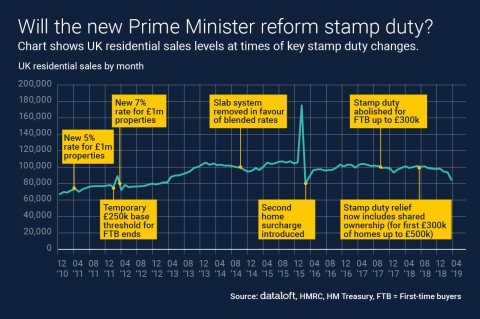
Will the new Prime Minister reform stamp duty?
Among other factors (policy and economic performance being key), changes to taxation in the form of stamp duty land tax at point of sale can have a big impact on the level of activity in the UK housing market. The most recent significant impacts on the market have been the higher rate taxes on the market over £1million and the surcharge on second homes.
Stamp duty reform has sometimes been used to cool the market, for example by increasing taxes at the top end, deterring purchases of second homes with extra levies and also by improving transparency and thereby making it less attractive to buy through a company. Stamp duty has also been a tool to stimulate the housing market, supporting buyers struggling to get on the ladder by raising the base threshold, providing stamp duty holidays and exemptions for first-time and shared ownership buyers.
The new Prime Minister, Boris Johnson, has said he is considering stamp duty reform during his premiership. Measures he has aired publicly to date include:
Increasing the base threshold to £500,000 from £125,000 (to increase activity at the bottom end of the market, especially once Help to Buy ends)
Reducing the top rate tax to 7% from 12% for £1.5m+ homes (to increase activity at the top end of the market, which has been very subdued in recent years)
Sellers paying stamp duty and not buyers. However this is likely to be very unpopular with current owners having to pay tax twice.
He has not said he is considering reforming the 3% surcharge on second home purchases.

